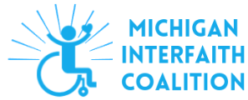Resources for Families

The crisis caused by the Auto No-Fault Reform through 45% pay cuts and loopholes for insurance companies forced providers to shutdown or stop providing services to auto crash survivors. The care that injured persons received to sustain their very lives was in many cases lost overnight. It has become nearly impossible for survivors to access care after the reform, leaving families to provide nurse-level care without pay or displacing survivors into hospitals and nursing homes.
The Michigan Interfaith Coalition is trying to help families by compiling a list of needed resources, connecting families to community organizations, and identifying providers who can still take auto insurance. It is our duty as faith leaders to care for the most vulnerable in our society, by acting with compassion, kindness and love.
Navigating Auto Reform
Resources to help you navigate the auto reform, such as how to file a DIFS complaint.
Advocacy & Lobbying Groups
Advocacy and lobbying groups representing either survivors and families, providers, or both.
Homecare Agencies
Home health care and private duty nursing agencies that may still be taking auto accident patients.
Accessibility
Providers and organizations focused on universal or disability access, such as ADA compliance, home modifications, vehicle modifications, etc.
Independent Case Managers
Independent case managers that may still be taking auto accident patients. These case managers help patients navigate the complex healthcare system, and can be hired to represent the best interests of the patient, not the auto insurance companies.
Law Firms
Law firms that handle No-Fault Auto cases. Some may handle only first-party case, others third-party, and others both.
Physician & Specialty Clinics
Physician/specialist clinics that may still be taking auto accident patients. This includes Physical Medicine (PM&R), Musculoskeletal, Neurology, Wheelchair Sitting, and others.
Rehab Facilities (Post-Acute)
Rehabilitation facilities that may still be taking auto accident patients.
Residential Facilities & Group Homes
Residential facilities and group homes which may still be taking auto accident patients, through a variety of funding that may include No-Fault Auto PIP benefits, Medicaid, Aging Agency funding, private funding, and others.
Support Groups
Support groups for injured persons and families, focused on different types of injuries.
Therapy & Rehabilitative Services
Providers of therapeutic services (PT, OT, SLP, Psychotherapy, Vocational) and in-home rehabilitation which may still be taking auto accident patients.
Other Family Resources
Miscellaneous resources for injured persons and families, such as providers and organizations that focus on very specific needs.
Information from you
Can you suggest other resources for injured persons and their families? Are you a provider still willing to accept auto insurance?
Latest Resources for Families
